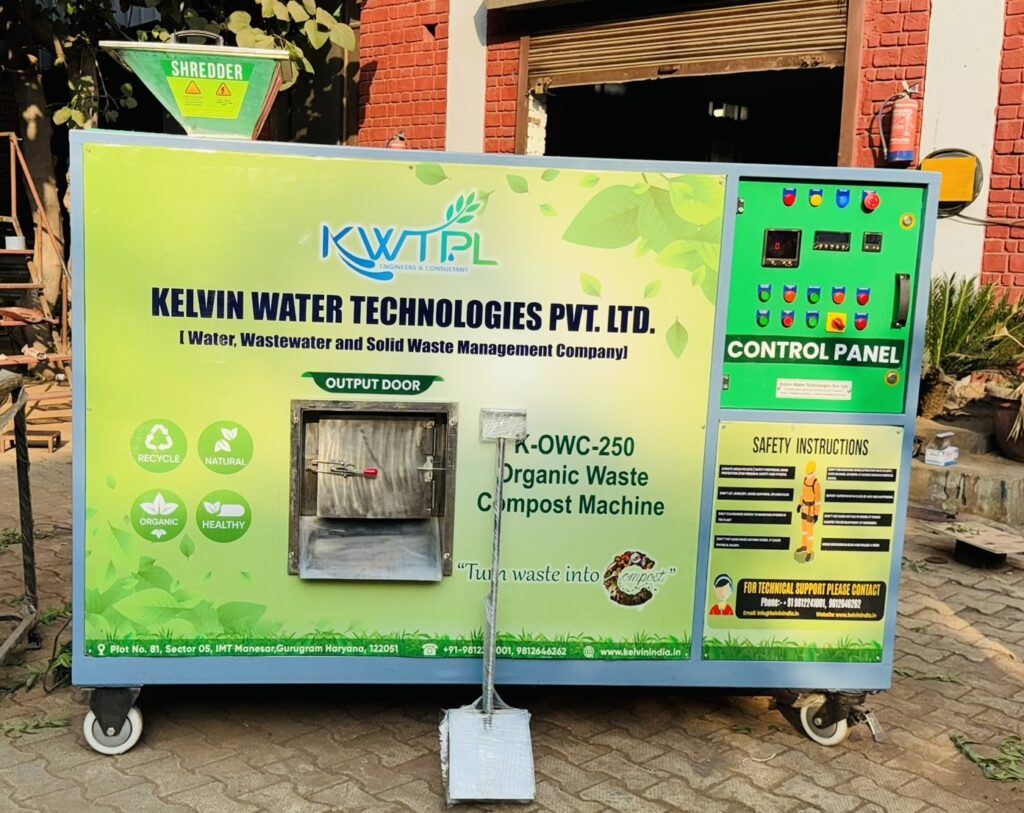Solid Waste Management

Solid waste management has become one of the most pressing challenges of urbanization and industrialization. With growing populations, rapid development, and increasing consumption patterns, cities around the world are generating massive amounts of solid waste. According to global reports, urban areas contribute to nearly 2.01 billion tonnes of municipal solid waste annually, and this figure is expected to rise drastically in the coming decades.
Effective solid waste management is not just about disposing of waste but involves collection, segregation, transportation, recycling, treatment, and safe disposal. If handled properly, waste can be converted into useful resources, reducing pollution and conserving natural ecosystems. In India, with initiatives like Swachh Bharat Abhiyan, more emphasis has been placed on sustainable waste handling.
Among the organizations contributing to this goal, Kelvin Water Technologies Pvt. Ltd. stands out as a reliable manufacturer and supplier of waste management solutions that help institutions, residential societies, industries, and municipalities manage their waste effectively.
What is Solid Waste Management?
Solid waste management refers to the systematic control of the generation, storage, collection, transfer, processing, and disposal of solid wastes in a manner that safeguards public health, preserves the environment, and promotes resource recovery.
Categories of Solid Waste
1. Municipal Solid Waste (MSW): Household garbage, food scraps, plastics, papers, glass, etc.
2. Industrial Waste: Hazardous chemicals, metals, and byproducts from manufacturing industries.
3. Biomedical Waste: Waste from hospitals and clinics, including contaminated materials.
4. Electronic Waste (E-Waste): Old computers, mobile phones, and electronic equipment.
5. Agricultural Waste: Crop residues, animal waste, and organic matter.
Importance of Solid Waste Management
1. Environmental Protection: Prevents soil, water, and air pollution caused by improper dumping.
2. Public Health: Reduces risks of diseases spread by pests and microorganisms breeding in waste.
3. Resource Recovery: Recycling and composting convert waste into usable raw materials or energy.
4. Aesthetic Value: Maintains cleanliness in cities, enhancing quality of life.
5. Sustainable Development: Encourages responsible consumption and eco-friendly living.
Methods of Solid Waste Management
1. Segregation at Source: Dividing waste into dry, wet, and hazardous categories for easier processing.
2. Collection and Transportation: Using modern vehicles and covered bins to prevent littering.
3. Composting: Biological decomposition of organic waste to produce nutrient-rich compost.
4. Recycling: Converting plastics, glass, paper, and metals into reusable products.
5. Incineration: Burning waste at high temperatures to reduce volume and generate energy.
6. Sanitary Landfills: Controlled disposal of non-recyclable and hazardous waste in engineered pits.
7. Waste-to-Energy Technologies: Generating electricity or fuel from municipal and industrial waste.
Role of Technology in Modern Waste Management
Technology plays a significant role in transforming waste into resources. Automated composters, smart bins, baling machines, and shredders are now being widely used to minimize manual effort and maximize efficiency. Digital monitoring, IoT-enabled systems, and decentralized waste treatment are becoming key trends.
Kelvin Water Technologies Pvt. Ltd. in Solid Waste Management
Kelvin Water Technologies Pvt. Ltd. is a pioneer in providing innovative and eco-friendly solutions for waste management and water treatment. The company specializes in designing, manufacturing, and supplying a wide range of equipment that addresses different stages of waste processing.
Key Solid Waste Management Products by Kelvin
1. Organic Waste Composter (OWC):
- A machine designed to convert organic kitchen and garden waste into nutrient-rich compost.
- Available in semi-automatic and fully automatic models.
- Ideal for hotels, restaurants, housing societies, and institutions.
- Reduces landfill burden by treating biodegradable waste at source.
2. In-Vessel Composter:
- Enclosed composting system for large-scale organic waste processing.
- Ensures odor-free and hygienic compost production.
- Perfect for municipal corporations and industrial campuses.
3. Food Waste Composting Machine:
- Specifically designed for food waste from restaurants, canteens, and hotels.
- Converts waste into compost within 24–48 hours.
- Reduces waste disposal costs and environmental impact.
4. Baling Press Machines:
- Used to compress recyclable materials like paper, plastics, and cardboard into compact bales.
- Makes storage, handling, and transportation easier.
- Available in vertical, horizontal, and fully automatic models.
5. Shredders:
- Reduces the volume of solid waste by shredding plastics, paper, and garden waste.
- Enhances the efficiency of recycling and composting processes.
6. Waste-to-Energy Solutions:
- Customized setups for converting non-recyclable waste into energy.
- Supports sustainable energy goals and reduces landfill dependency.
Why Choose Kelvin Products for Waste Management?
- Eco-Friendly Design: All products are engineered to promote sustainability.
- Wide Range of Solutions: From composting to recycling, Kelvin offers complete solid waste management systems.
- Customized Machines: Tailor-made solutions based on client needs and waste generation capacity.
- Durability & Efficiency: High-quality manufacturing ensures long life and consistent performance.
- After-Sales Support: Dedicated team for installation, training, and maintenance.
Benefits of Adopting Kelvin’s Waste Management Systems
- Cost Savings: Reduces municipal waste disposal fees.
- Compliance: Ensures adherence to environmental regulations.
- Green Branding: Helps organizations showcase their commitment to sustainability.
- Resource Recovery: Produces compost, recycled material, and energy from waste.
- Community Impact: Encourages responsible waste handling at the local level.
Future of Solid Waste Management
The future lies in integrated waste management systems that combine recycling, composting, and energy recovery. With smart city initiatives, decentralized composting units, and advanced recycling facilities, waste will no longer be seen as a liability but as a valuable resource. Companies like Kelvin Water Technologies Pvt. Ltd. will play a vital role by offering innovative products and services that make sustainable waste management possible for every scale—residential, commercial, and industrial.
Conclusion
Solid waste management is not just an environmental necessity but also an opportunity to recover resources, save costs, and promote a healthier society. By adopting modern technologies and eco-friendly practices, we can reduce the burden on landfills and contribute to a cleaner planet.
Kelvin Water Technologies continues to lead the way by providing advanced composters, balers, shredders, and waste-to-energy solutions that make waste management efficient and sustainable. Whether for small communities or large-scale industries, Kelvin’s products ensure that waste is managed responsibly, turning challenges into opportunities for a greener tomorrow.